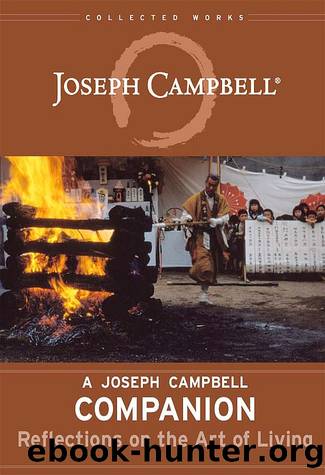A Joseph Campbell Companion: Reflections on the Art of Living by Joseph Campbell & Robert Walter & David Kudler

Author:Joseph Campbell & Robert Walter & David Kudler [Campbell, Joseph & Walter, Robert & Kudler, David]
Language: eng
Format: epub
Tags: Body, Politics & Social Sciences, Personal Transformation, Psychology, Philosophy, mind, Spirit, Spirituality, mythology, Self-Help, Personal Growth, Religion & Spirituality, Social Sciences, Folklore & Mythology
ISBN: 9781611780062
Amazon: B005HFL3MW
Publisher: Joseph Campbell Foundation
Published: 2011-08-02T04:00:00+00:00
Gnosticism is the Western
counterpart of Buddhism.
Thomas says, in other words, that there is a revelation possible to you right now. It is here. So, âto be happy with Him forever in heavenâ means to reach that depth now. Itâs a totally different slant.
If you read Christian mythology
in the Gnostic way,
it makes universal sense.
Yet because the Catholic church insists that the coming of the Kingdom of the Father is going to be a historical event, every now and then, especially every thousand years, people think the end of the world is coming. In the year 1000, for instance, it was thought the end of the world was going to come, so people with a lot of property gave their property to the church to gain merit. There are still cases in the French courts to get that property back. Now itâs time for the second millennium, so everyone is expecting annihilation. These expectations come automatically. Thereâs always a way to envision that the end is going to happen. I do not know what the situation will be in the year 3000, but if any of you happen to be around in a later incarnation, you can expect that there will be some kind of panic.
You see, Christianity was born in a panic time. In the centuries just before the Christian era, the Levant was in turmoil. The Hellenistic empire was breaking up, Rome was in its ascendancy, and the Jewish community was in a hell of a condition.
In 167 B.C., Antiochus IV Epiphanes, the Seleucid emperor of Syria, installed a Greek altar on the Jewish altar in the temple court of Jerusalem. By establishing a Greek shrine in the Jewish temple compound, he hoped he would show that this religion was a variant of what all religions are about. No siree! Instead, Judas Maccabeus and his brothers killed the commissioner who was to establish the shrine. There was an uproar, the Maccabean revolt, which led to independent governance of the Jewish state for nearly a hundred years by a succession of Maccabean priest-kings.
In the age of the Maccabees the leaders in Jerusalem of the Hellenizing party were the Sadducees, among whom were priestly families claiming descent from the priestly patriarch Zadoc (Zadoc>Sadducee), and these were opposed chiefly by the Pharisees, or âSeparatists,â who believed themselves to be of a stricter orthodoxyâthough, in fact, they had combined the old Hebrew heritage of a Day of Yahweh to come with the idea of the world end of Zoroastrian eschatology.101
During that period there was continual internecine conflict, which intensified in 104 B.C., when the Jewish king Aristobulus claimed that he was, essentially, also the Messiah. This was heresy! Though he reigned only a year, his son, Alexander Jannaeus, spent the next thirty fighting a series of wars and suppressing all Jewish insurrections with his foreign troops.
And with [his] death, 76 B.C., the Pharisees came to power, and the internecine tide only ran the other way. New purges, fratricides, betrayals, liquidations, and miracles kept the
Download
This site does not store any files on its server. We only index and link to content provided by other sites. Please contact the content providers to delete copyright contents if any and email us, we'll remove relevant links or contents immediately.
| Anthropology | Archaeology |
| Philosophy | Politics & Government |
| Social Sciences | Sociology |
| Women's Studies |
Cecilia; Or, Memoirs of an Heiress — Volume 1 by Fanny Burney(31326)
Cecilia; Or, Memoirs of an Heiress — Volume 3 by Fanny Burney(30929)
Cecilia; Or, Memoirs of an Heiress — Volume 2 by Fanny Burney(30886)
The Great Music City by Andrea Baker(21197)
We're Going to Need More Wine by Gabrielle Union(18067)
Bombshells: Glamour Girls of a Lifetime by Sullivan Steve(13102)
Pimp by Iceberg Slim(12924)
All the Missing Girls by Megan Miranda(12741)
Fifty Shades Freed by E L James(12445)
Norse Mythology by Gaiman Neil(11876)
Talking to Strangers by Malcolm Gladwell(11865)
Crazy Rich Asians by Kevin Kwan(8343)
Mindhunter: Inside the FBI's Elite Serial Crime Unit by John E. Douglas & Mark Olshaker(7831)
The Lost Art of Listening by Michael P. Nichols(6465)
Enlightenment Now: The Case for Reason, Science, Humanism, and Progress by Steven Pinker(6404)
Bad Blood by John Carreyrou(5763)
The Four Agreements by Don Miguel Ruiz(5504)
Weapons of Math Destruction by Cathy O'Neil(5032)
We Need to Talk by Celeste Headlee(4863)
